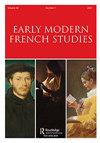反对统一:古尔内的语言文学哲学
IF 0.1
3区 历史学
Q2 HISTORY
引用次数: 0
摘要
玛丽·德·古尔奈(Marie de Gournay)对具象语言的辩护和对新古典主义巴黎当权派所倡导的净化语言的攻击是一场政治和美学的论战。清晰简洁的新古典主义理想不仅通过其对隐喻使用的敌意使语言变得贫乏;它通过特殊的符号来抑制稀有情感状态的表达,从而攻击人的主体性。强加统一、严格的民族语言的努力被谴责为一种文化霸权,在这种霸权中,方言的个人和地区差异被压制。本文章由计算机程序翻译,如有差异,请以英文原文为准。
Against Uniformity: Gournay’s Philosophy of Language and Literature
Marie de Gournay’s defense of figurative language and her attack on the purified language championed by the neoclassical Parisian establishment is a political as well as aesthetic polemic. The neoclassical ideal of clear, concise speech not only impoverishes language through its animus toward the use of metaphor; it assaults human subjectivity by suppressing the expression of rare emotional states through idiosyncratic symbols. The effort to impose a uniform, chastened national language is condemned as a species of cultural hegemony, in which individual and regional variations on the vernacular are suppressed.
求助全文
通过发布文献求助,成功后即可免费获取论文全文。
去求助
来源期刊

Early Modern French Studies
Multiple-
CiteScore
0.10
自引率
0.00%
发文量
14
期刊介绍:
Early Modern French Studies (formerly Seventeenth-Century French Studies) publishes high-quality, peer-reviewed, original articles in English and French on a broad range of literary, cultural, methodological, and theoretical topics relating to the study of early modern France. The journal has expanded its historical scope and now covers work on the sixteenth, seventeenth, and eighteenth centuries. Within this period of French literary and cultural history, the journal particularly welcomes work that relates to the term ''early modern'', as well as work that interrogates it. It continues to publish special issues devoted to particular topics (such as the highly successful 2014 special issue on the cultural history of fans) as well as individual submissions.
 求助内容:
求助内容: 应助结果提醒方式:
应助结果提醒方式:


